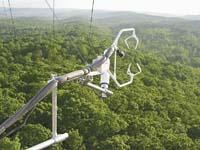Old, neutral forests? Of course!

Boreal and temperate primary forests, i.e. mature forests without human intervention in boreal and temperate regions, account for 15% of the world's forests and, as the journal Nature has just announced, produce about 10% of the net production of global organic matter.
To this conclusion, researchers from the University of Antwerp (Belgium) have analyzed the data collected in 519 places of the FLUXNET network. FLUXNET is a worldwide network of observatories for measuring the carbon flow between ecosystems and the atmosphere, which measure the exchange of carbon dioxide, water vapor and energy.
This research has removed a still widespread idea that adult forests are carbon neutral. Many believe that through breathing and putrefaction of dead parts, they release to the atmosphere the carbon that retains a mature forest.
However, the new research indicates that older forests retain more carbon than they release, because old trees have a low rate of respiration, because even being old they continue to grow, and because new trees emerge and grow in those forests.





